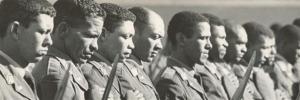
Transgenerational trauma of war highlighted through Cape Corps community engagement
What happens when people's traumatic histories are silenced? This was the premise of a post-doctoral research project that led to a poignant gathering in the South African Cape Corps Memorial Hall in Athlone where military veterans and family members revisited a buried chapter of history.
Dr Danille Bester, a postdoctoral fellow at the Centre for the Study of the Afterlife of Violence and Reparative Quest (AVReQ) at Stellenbosch University (SU), recently gave an overview of the event. The purpose of Bester's study was to revisit the history of the South African Cape Coloured Corps and to create awareness of the afterlife of violence and an appreciation of why repair is imperative for social justice.
Military veterans and family members were invited to share personal narratives of “The Forgotten Ones". An exhibition of historical photos and a ceremony to honour the fallen soldiers who offered their lives in service of a country that had not yet freed them from segregation, added to the impactful engagement on 7 July.
The Cape Coloured Corps was first mobilised during the First World War as a combatant unit and was recruited from the coloured community. They were later drafted by the armed forces of the British Empire and apartheid government in the Second World War and the Border Wars of the 1970s and 1980s. Despite this legacy, their service to the country often went unacknowledged in the public space.
The Cape Coloured Corps represents a marginalised aspect of South African military history that has not received the recognition or honour earned by other war veterans, Bester explained. The community dialogue, attended by close to 80 people, served to raise awareness of the suppressed history and how such historical injustice continues to ripple into the future.
At the event, Abdul Waggie, a member of the South Africa Cape Corps Military Veteran Association, spoke movingly about how his father's war experiences impacted their relationship. “Although my father never really talked about his military years, it was clear he still carried a lot of trauma from that time. He was an angry man," Waggie said. “My father had a deep-rooted hate for the government. He came back from the war with so much pain. It could never be healed. He died like that."
Waggie shared a childhood memory of how his father, who served in Egypt and Italy during the Second World War, would throw stones at the statue of General Jan Smuts on the corner of Adderley and Wale Streets in Cape Town. “He spit and cursed at the statue. He made such a scene that the police arrested him. They only released him because I was with him."
Post-demobilisation, veterans of the Cape Corps were denied benefits such as military pensions that their white counterparts received. Waggie spoke about a grudge many veterans had against the government. “When my father returned from the war, he only got a bicycle, a coat and a tent," Waggie said.
Many of the other stories echo the resentment of Cape Corps soldiers who felt betrayed by the government they had served. Some veterans returned home to antagonism and resentment from their communities for their participation in wars on behalf of an undemocratic government.
The personal stories from family members were enriched with a keynote address by Emeritus Prof Albert Grundlingh of SU's History Department who provided historical context to the Cape Corps' active years. “The academic viewpoint was significant because many of the attendees didn't know that part of the history had been documented. It showed how the personal trauma that's been suppressed interacts with this very violent history," Bester noted.
AVReQ hosted a post-event seminar where René van der Berg, SU's social media coordinator, was invited to share letters, photos and documents of her great-grandfather, Joseph Ralph van der Poel, who served with the Cape Corps from 1940 to 1944.
Bester said the project combined two interests for her – a personal military background and a passion for coloured identity. “My field of study is psychology – a helping profession – and part of the initial goal was to try and facilitate some change." She described the engagement as deeply meaningful and said it showed how reparative justice may begin a process to restore dignity and create awareness of the afterlife of violence.
Bester said she would investigate ways of capturing the narratives of the people who have been impacted by this tragic history. “Military veterans are nearing the end of their lives and it is crucial to record their experiences and preserve archives that document this chapter of public history. The feedback from the community has been overwhelmingly positive. I think there are still many opportunities to engage with this topic to capture the stories in a visual format and to record the narratives in creative ways. This project has shown how important it is to revisit history to understand generational trauma that still impact our lives today."
- The Cape Corps Exhibition is part of AVReQ's research for social impact through public dialogue events. The project is supported through Dr Danille Bester's postdoctoral prestige scholarship awarded by the National Institute for the Humanities and Social Sciences.
PHOTO: Cape Argus, Independent Newspapers
Photos below:
The community engagement included a photo exhibition, a ceremony to commemorate fallen war heroes, and an address by Emeritus Prof Albert Grundlingh about the historical context of the South African Cape Coloured Corps. A panel discussion facilitated by Dr Danille Bester led to a meaningful discussion about the legacy of the SACCC.